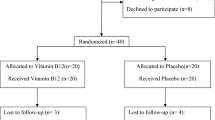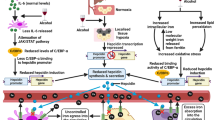Abstract
This study is conducted in chronic alcoholics to assess the association of an Individual’s level of serum homocysteine with the success of achieving alcohol deaddiction in the patient. The patients’ nutrition status is also assessed. 50 chronic alcoholics admitted to a deaddiction center were inducted into the study. Patients underwent an 8 weeks holistic program to promote rehabilitation from alcoholism. All the patients were addicted to alcohol for 8 – 10 years. Of the 50 patients enrolled, 39 of them completed the 8 weeks program including complete abstinence from alcohol during this period. Fasting blood samples were collected on admission and again after 8 weeks of alcohol abstinence for analyses of serum homocysteine and serum prealbumin, transferrin, total proteins and albumin, gammaglutamyl transferase (GGT) and alanine transaminase (ALT). Of the 50 patients enrolled in the study, 39 completed the 8 weeks rehabilitation program. 11 patients discontinued within 2 weeks of admission. During the 8 weeks of complete alcohol abstinence, patients were given a balanced diet and multivitamin supplements. A significant improvement in their nutritional status was noted by the elevation of serum levels of prealbumin, transferrin, total proteins and albumin. Serum homocysteine levels decreased significantly (p<0.002) to normal levels from previous hyperhomocytenemia. This was accompanied by decrease in serum GGT and ALT levels indicating improved liver functions. Serum estimation of homocysteine in chronic alcoholics is important to assess whether the patient will have a successful rehabilitation. Normal homocysteine levels are achieved after dietary changes and abstinence from alcohol. Timely correction of hyperhomocysteinemia also provides successful rehabilitation.
Similar content being viewed by others
References
Bonsch D, Lenz B, Reulbach U, Kornhuber J, Bleich S. Homocysteine associated genomic DNA hypermethylation in patients with chronic alcoholism. J Neural Transm 2004 Dec; 111(12): 1611–1616.
Refsun H, Ueland P, Nygärd O, Vollset SE. Homocysteine and cardiovascular disease. Annu Rev Med 1998; 49: 31–62
Ji C, Kaplowiz N. Hyperhomocysteinemia, endoplasimic reticulum stress, and alcoholic liver injury. World J Gastro 2004; 10: 1699–1708.
Bayes B, Pastor MC, Bonal J, Romero R. New cardiovascular risk factors in patients with chronic kidney disease: Role of folic acid treatment. Kidney Int 2005;67: S39–S43.
Cravo ML, Camilo ME. Hyperhomocysteinemia in chronic alcoholism relations to folic acid and vitamins B6 and B12 status. Nutrition 2000;16: 296–302.
Cravo ML, Gloria LM, Selhub J, Nadeau Mr, Camilo ME, Resende MP, Cardoso JN, Leitao CN, Mitra FC. Hyperhomcysteinemia in chronic alcoholism: correlation with folate, vitamin B12 and Vitamin B6 status. Am J Clin Nutr 1996;63: 220–224.
Joline WJ, Aafje S, Gertjan S, Kok FJ, Struys EA, Jakobs C, Hendriks FJ. Kinetics of homocysteine metabolism after moderate alcohol consumption. Alcohol Clin Exp Res 2005; 29:739–745.
Bleich S, Degner D, Javaheripour K, Kurth C, Kornhuber J. Homocysteine and alcoholism. J Neural Transm Supl 2000;60:187–196.
Bleich S, Degner D, Bandelow B, Von Ahsen N, Ruther E, Kornhuber J. Plasma homocysteine is a predictor of alcohol withdrawal seizures. Neuroreport 2000;11: 2749–2752.
Baernstein HD. A modification of the method for determining methionine in proteins. J Biol Chem 1934; 106: 451–456.
Clarke S, Banfield K. S-Adenosylmethionine-dependent methyltransferases. In: Carmel R, Jacobsen DW, eds. Homocysteine in Healsth and Disease. UK: Cambridge University Press, 2001: 63–78.
Bleich S, Degner D, Wiltfang J, Maler JM, Niedmann P, Cohrs S, Mangholz A, Porzing J, Sprung R, Ruther E, Kornhuber J. Elevated homocysteine levels in alcohol withdrawal. Alcohol Alcoholism 2000;35:351–354.
Bleich Stefan, Carl Marco, Bayerlein Kristina, Reulbach Udo, Biermann Teresa, Hillemacher Thomas, Bonsch Dominikus, Kornhuber Johannes. Evidence of Increased Homocysteine Levels in Alcoholism: The Franconian Alcoholism Research Studies (FARS). Alcoholism: Clinical & Experimental Research. 29(3): 334–336, March 2005.
Author information
Authors and Affiliations
Corresponding author
Rights and permissions
About this article
Cite this article
Devika Rani, K., Suneetha, N., Mohanty, S. et al. Association of hyperhomocysteinemia to alcohol withdrawal in chronic alcoholics. Indian J Clin Biochem 23, 150–153 (2008). https://doi.org/10.1007/s12291-008-0033-3
Published:
Issue Date:
DOI: https://doi.org/10.1007/s12291-008-0033-3




